Angela Ackerman's Blog: Writers Helping Writers, page 172
October 29, 2012
Your Blog As A Promotion & Branding Tool
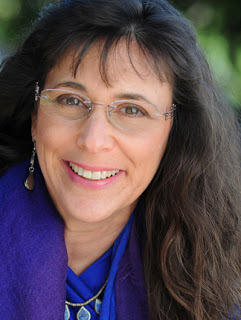
I am super excited to welcome Nina Amir, Inspiration to Creation Coach, who inspires people to combine their purpose and passion so they Achieve More Inspired Results. She motivates both writers and non-writers to create publishable and published products, careers as authors and to achieve their goals and fulfill their purpose.
Nina's new book
How
to Blog a Book, Write, Publish and Promote Your Work One Post at a Time is of special interest to Becca and I as we go about transforming some of the most popular blog thesauri here into books!
Do you ever wonder if all that great content you write about each week can and should be converted into a book? If so, this is a very good resource to check out--Nina knows her stuff!
How a Blog Allows You to Promote as You Write
By
Nina Amir
Writers write. That’s what we do. That’s
what we are good at. And that’s why we balk at promoting ourselves and our
books.
We don’t do promotion. It’s not our job. It’s not what we are good at.
Here’s the rub. If we don’t promote
ourselves and our books we:
Don’t get book publishing contracts.
Don’t sell many self-published or traditionally published books.
Don’t get many freelance writing jobs.
Don’t make as much money.
That leaves you and me with a few options. If
we are stubborn, we can maintain our position: I don’t do promotion. I’m a
writer. Period.
Fine. Then ask yourself: Do I want to
become a successful writer? If so, define what success means to you. If success means selling more than the
average 250-500 books per year or earning more than a four-figure income per
year from writing, you must change your attitude and embrace promotion.
Don’t fret! You can do so simply by writing.
You can promote yourself and your forthcoming or published book with a blog.
What
to Blog About
Yes, a blog involves a different type of
writing in addition to your other writing, but it’s writing! You simply need to
commit to writing a short blog post—250-500 words—a few times—2-5—a week. That’s
not so bad.
And there are so many things you can write
about. I came up with 20
things aspiring and published authors could blog about. Book marketing
expert John Kremer came up with 101.
Look at the topics you feel passionate about or your forthcoming and published
books and come up with a list of possible topics. Make a content plan for each
month, if that is easier for you.
Or pick a theme and stick to it. In the
process, you’ll become an authority. You
can even do this on many topics. This will help you land more book contracts
and writing assignments—and added bonus of blogging.
The
Blog as an Author Website and Branding Tool
Still having trouble wrapping your busy writing
fingers around this concept? Consider this: Do you write morning pages? Keep a
journal? Spend time emailing friends? Blogs began as online journals. Take on
blogging as an author website where you can brand yourself by revealing the
many aspects of who you are as a writer. Connect with potential readers, let
them know more about your through your posts, and show off your awesome writing
talent for potential book, newspaper and magazine publishers. (And, of course,
feature your published works.)
Simply start your daily writing period with
30-45 minutes of blog writing. Compose a short post about whatever is on your mind
that day. You can even add in your own photos and videos easily created on your
iPhone or other android phone. Have fun with your blog. Make it a creative
statement.
The
Blog as a Writing Machine
If this still seems like a superfluous
activity, then get down and dirty with your tactics. Use your blog as a way to
write a book. Indeed, blogging a book is the quickest and easiest way to write
your book and promote it at the same time. You’ll hardly know you are promoting
your work at all!
When you blog a book, you publish your
writing regularly and consistently on the internet as you create your first
draft. This allows you to garner a loyal following of readers—fans—for your
book as you write it. These fans then purchase the finished product. They also
help promote your blog and the book when it is published. Plus, if your blog
becomes popular, you might land a publishing deal in the process.
Here are the basic steps for blogging a
book:
Pick a topic. Choose a topic you are passionate about and can blog about for
a long time
Determine if your
book is viable. Your book idea should have a
large enough market and be unique among existing blogs and books.
Map out your book’s
content. Brainstorm all the content that could
be in included in your book and organize it a table of contents.
Come up with a content plan. Determine what content that
will appear in the published book but not on the blog.
Break the contents down into posts-sized pieces (250-500 words). Each post should have a title.
Write and publish posts on a schedule. Write
and publish 2-7 times per week for the first 6-12 months; then you can reduce
the number of times you post.
Create a manuscript. Write your posts in a word
processing program, and then copy and paste them into your blog.
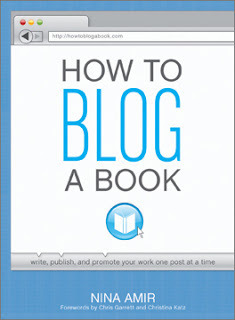
Go ahead. Write. And blog. In the process, promote
yourself and your work by doing what you do best.
The author of How
to Blog a Book, Write, Publish and Promote Your Work One Post at a Time , Nina has also self-published 10 short books. A sought after editor, proposal consultant, book and author coach, and blog-to-book coach, Nina’s clients’ books have sold upwards of 230,000 copies and landed deals with top publishers.
She is the founder of Write Nonfiction in November and writes four blogs, including Write
Nonfiction NOW!, How to Blog a
Book, and As
the Spirit Moves Me. Sign up for a free author, book or blog-to-book coaching session with Nina or receive her 5-Day Published Author Training Series. You can find more about Nina at her website, or follow her on Twitter, Facebook.

Published on October 29, 2012 04:00
October 27, 2012
Physical Attributes Thesaurus: Legs
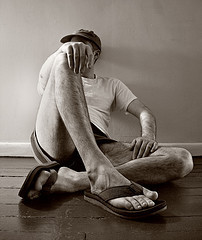
Courtesy of Nicholas_T
Physical description of a character can be difficult to convey—too much will slow the pace or feel 'list-like', while too little will not allow readers to form a clear mental image. If a reader cannot imagine what your character looks like, they may have trouble connecting with them on a personal level, or caring about their plight.
One way to balance the showing and telling of physical description is to showcase a few details that really help 'tell the story' about who your character is and what they've been through up to this point. Think about what makes them different and interesting. Can a unique feature, clothing choice or way they carry themselves help to hint at their personality? Also, consider how they move their body. Using movement will naturally show a character's physical characteristics, keep the pace flowing and help to convey their emotions.
LEGS
Descriptors: shapely, curvy, scrawny, thin, plump, muscular, sinewy, athletic, long, stumpy, stubbly, hairy, sleek, tanned, pale, veined, strong, wobbly, spindly, bowed, weak
Things Legs Do (and other words/phrases to describe those actions)
Move: run, walk, jog, stride, sprint, pump, piston, leap, jump, dash, dart, lope, trot, pummel
Dance: boogie, cavort, careen, hop, jive, frolic, prance, caper, jitter
Key Emotions and Related Leg Gestures:
Nervousness: tingle, tremble, shiver, quiver, shake, shift, cross/uncross, pace
Terror: give out, collapse, bolt, run, seize, go limp, lose strength, wobble
Excitement: jitter, bounce, jump
Simile and Metaphor Help:
Her legs were as shaky as a new colt’s.
Adrenaline flooded my body, turning my scrawny legs to pistons.
Clichés to Avoid: legs like tree trunks, toothpicks, or chicken legs
HINT: When describing any part of the body, try to use cues that show the reader more than just a physical description. Make your descriptions do double duty.
Example: Jenna’s legs were all muscle, pushing and pulling and working with no sign of fatigue. Right now, she was just running a treadmill; if she ever had to escape a psychotic lunatic, my money was on Jenna.
BONUS TIP: The Colors, Textures & Shapes Thesaurus in our sidebar might help you find a fresh take on some of the descriptors listed above!

Published on October 27, 2012 01:00
October 23, 2012
Nanowrimo Participants WIN BIG!
We love writers. A lot. But, if there is one thing we love more, it is the obsessive, sanity-deprived, coffee-in-veins breed of individuals who attempt to
pound out 50K in a single month. Yes, we're talking NANOWRIMO, the crazy phenomenon when writers lock their Internal Editor into a tiny imaginary room filled with clowns and revel in the screams as they type, uninterrupted.
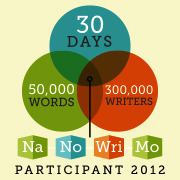
I have Nano'd in the past, but often the timing isn't quite right. Well, the timing this November isn't great with Becca and I hustling to get the next Thesaurus book written, yet I'm taking the plunge anyway! Why? Because I've been revising, revising, revising, and now I'm ready to do some creating. I have this idea about shadow children and a school photographer who isn't human, and the idea won't let go. So, what better chance to sit down and get the story out than NANOWRIMO?
Because Becca recognizes (and probably fears) my special brand of insanity, she's totally cool with me going dark here at the blog for November. And, because she loves to encourage people as much as I do, we're offering a juicy, book-a-licious carrot to Nanowrimo Participants.
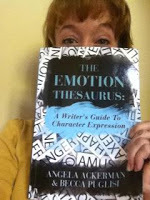
*DRUM ROLL*
Becca and I are giving away 10 digital copies of The Emotion Thesaurus: A Writer's Guide To Character Expression to participants (and winners) of Nanowrimo this year!
So, strap on your tinfoil hat and join the November Writing Spree! Set up a profile at NANOWRIMO and then fill out this fast form below...it's that easy. And, if your name is drawn and you happen to own a copy already, you can gift your prize to someone else! Christmas is coming, so why not play Santa?
ENTRY FORM
(CLICK TO ENTER!)
While I'm off writing this next month, make sure to stop in! Lots of cool stuff is going on as Becca runs amok er, takes care of everything. And if you are over at the Nano boards, look for the weirdo named Momzilla. :)
We would love to make sure as many NANOers find out about this contest as possible,
so we'll showcase a link in the sidebar until the end of November. People can feel free to sign up any time!
And if you guys would be willing to share this giveaway with any Nano groups you're with or on Facebook, Twitter, etc, we would be eternally grateful! :)
So, will you be joining the insanity? Let me know in the comments!


pound out 50K in a single month. Yes, we're talking NANOWRIMO, the crazy phenomenon when writers lock their Internal Editor into a tiny imaginary room filled with clowns and revel in the screams as they type, uninterrupted.

I have Nano'd in the past, but often the timing isn't quite right. Well, the timing this November isn't great with Becca and I hustling to get the next Thesaurus book written, yet I'm taking the plunge anyway! Why? Because I've been revising, revising, revising, and now I'm ready to do some creating. I have this idea about shadow children and a school photographer who isn't human, and the idea won't let go. So, what better chance to sit down and get the story out than NANOWRIMO?
Because Becca recognizes (and probably fears) my special brand of insanity, she's totally cool with me going dark here at the blog for November. And, because she loves to encourage people as much as I do, we're offering a juicy, book-a-licious carrot to Nanowrimo Participants.

*DRUM ROLL*
Becca and I are giving away 10 digital copies of The Emotion Thesaurus: A Writer's Guide To Character Expression to participants (and winners) of Nanowrimo this year!
So, strap on your tinfoil hat and join the November Writing Spree! Set up a profile at NANOWRIMO and then fill out this fast form below...it's that easy. And, if your name is drawn and you happen to own a copy already, you can gift your prize to someone else! Christmas is coming, so why not play Santa?
ENTRY FORM
(CLICK TO ENTER!)
While I'm off writing this next month, make sure to stop in! Lots of cool stuff is going on as Becca runs amok er, takes care of everything. And if you are over at the Nano boards, look for the weirdo named Momzilla. :)
We would love to make sure as many NANOers find out about this contest as possible,
so we'll showcase a link in the sidebar until the end of November. People can feel free to sign up any time!
And if you guys would be willing to share this giveaway with any Nano groups you're with or on Facebook, Twitter, etc, we would be eternally grateful! :)
So, will you be joining the insanity? Let me know in the comments!


Published on October 23, 2012 22:44
Nanowrimo Participants WIN BIG!
We love writers. A lot. But, if there is one thing we love more, it is the obsessive, sanity-deprived, coffee-in-veins breed of individuals who attempt to
pound out 50K in a single month. Yes, we're talking NANOWRIMO, the crazy phenomenon when writers lock their Internal Editor into a tiny imaginary room filled with clowns and revel in the screams as they type, uninterrupted.

I have Nano'd in the past, but often the timing isn't quite right. Well, the timing this November isn't great with Becca and I hustling to get the next Thesaurus book written, yet I'm taking the plunge anyway! Why? Because I've been revising, revising, revising, and now I'm ready to do some creating. I have this idea about shadow children and a school photographer who isn't human, and the idea won't let go. So, what better chance to sit down and get the story out than NANOWRIMO?
Because Becca recognizes (and probably fears) my special brand of insanity, she's totally cool with me going dark here at the blog for November. And, because she loves to encourage people as much as I do, we're offering a juicy, book-a-licious carrot to Nanowrimo Participants.

*DRUM ROLL*
Becca and I are giving away 10 digital copies of The Emotion Thesaurus: A Writer's Guide To Character Expression to participants (and winners) of Nanowrimo this year!
So, strap on your tinfoil hat and join the November Writing Spree! Set up a profile at NANOWRIMO and then fill out this fast form below...it's that easy. And, if your name is drawn and you happen to own a copy already, you can gift your prize to someone else! Christmas is coming, so why not play Santa?
ENTRY FORM
(CLICK TO ENTER!)
While I'm off writing this next month, make sure to stop in! Lots of cool stuff is going on as Becca runs amok er, takes care of everything. And if you are over at the Nano boards, look for the weirdo named Momzilla. :)
We would love to make sure as many NANOers find out about this contest as possible,
so we'll showcase a link in the sidebar until the end of November. People can feel free to sign up any time!
And if you guys would be willing to share this giveaway with any Nano groups you're with or on Facebook, Twitter, etc, we would be eternally grateful! :)
So, will you be joining the insanity? Let me know in the comments!



pound out 50K in a single month. Yes, we're talking NANOWRIMO, the crazy phenomenon when writers lock their Internal Editor into a tiny imaginary room filled with clowns and revel in the screams as they type, uninterrupted.

I have Nano'd in the past, but often the timing isn't quite right. Well, the timing this November isn't great with Becca and I hustling to get the next Thesaurus book written, yet I'm taking the plunge anyway! Why? Because I've been revising, revising, revising, and now I'm ready to do some creating. I have this idea about shadow children and a school photographer who isn't human, and the idea won't let go. So, what better chance to sit down and get the story out than NANOWRIMO?
Because Becca recognizes (and probably fears) my special brand of insanity, she's totally cool with me going dark here at the blog for November. And, because she loves to encourage people as much as I do, we're offering a juicy, book-a-licious carrot to Nanowrimo Participants.

*DRUM ROLL*
Becca and I are giving away 10 digital copies of The Emotion Thesaurus: A Writer's Guide To Character Expression to participants (and winners) of Nanowrimo this year!
So, strap on your tinfoil hat and join the November Writing Spree! Set up a profile at NANOWRIMO and then fill out this fast form below...it's that easy. And, if your name is drawn and you happen to own a copy already, you can gift your prize to someone else! Christmas is coming, so why not play Santa?
ENTRY FORM
(CLICK TO ENTER!)
While I'm off writing this next month, make sure to stop in! Lots of cool stuff is going on as Becca runs amok er, takes care of everything. And if you are over at the Nano boards, look for the weirdo named Momzilla. :)
We would love to make sure as many NANOers find out about this contest as possible,
so we'll showcase a link in the sidebar until the end of November. People can feel free to sign up any time!
And if you guys would be willing to share this giveaway with any Nano groups you're with or on Facebook, Twitter, etc, we would be eternally grateful! :)
So, will you be joining the insanity? Let me know in the comments!



Published on October 23, 2012 22:44
Nanowrimo Participants WIN BIG!
We love writers. A lot. But, if there is one thing we love more, it is the obsessive, sanity-deprived, coffee-in-veins breed of individuals who attempt to
pound out 50K in a single month. Yes, we're talking NANOWRIMO, the crazy phenomenon when writers lock their Internal Editor into a tiny imaginary room filled with clowns and revel in the screams as they type, uninterrupted.

I have Nano'd in the past, but often the timing isn't quite right. Well, the timing this November isn't great with Becca and I hustling to get the next Thesaurus book written, yet I'm taking the plunge anyway! Why? Because I've been revising, revising, revising, and now I'm ready to do some creating. I have this idea about shadow children and a school photographer who isn't human, and the idea won't let go. So, what better chance to sit down and get the story out than NANOWRIMO?
Because Becca recognizes (and probably fears) my special brand of insanity, she's totally cool with me going dark here at the blog for November. And, because she loves to encourage people as much as I do, we're offering a juicy, book-a-licious carrot to Nanowrimo Participants.

*DRUM ROLL*
Becca and I are giving away 10 digital copies of The Emotion Thesaurus: A Writer's Guide To Character Expression to participants (and winners) of Nanowrimo this year!
So, strap on your tinfoil hat and join the November Writing Spree! Set up a profile at NANOWRIMO and then fill out this fast form below...it's that easy. And, if your name is drawn and you happen to own a copy already, you can gift your prize to someone else! Christmas is coming, so why not play Santa?
ENTRY FORM
(CLICK TO ENTER!)
While I'm off writing this next month, make sure to stop in! Lots of cool stuff is going on as Becca runs amok er, takes care of everything. And if you are over at the Nano boards, look for the weirdo named Momzilla. :)
We would love to make sure as many NANOers find out about this contest as possible,
so we'll showcase a link in the sidebar until the end of November. People can feel free to sign up any time!
And if you guys would be willing to share this giveaway with any Nano groups you're with or on Facebook, Twitter, etc, we would be eternally grateful! :)
So, will you be joining the insanity? Let me know in the comments!

pound out 50K in a single month. Yes, we're talking NANOWRIMO, the crazy phenomenon when writers lock their Internal Editor into a tiny imaginary room filled with clowns and revel in the screams as they type, uninterrupted.

I have Nano'd in the past, but often the timing isn't quite right. Well, the timing this November isn't great with Becca and I hustling to get the next Thesaurus book written, yet I'm taking the plunge anyway! Why? Because I've been revising, revising, revising, and now I'm ready to do some creating. I have this idea about shadow children and a school photographer who isn't human, and the idea won't let go. So, what better chance to sit down and get the story out than NANOWRIMO?
Because Becca recognizes (and probably fears) my special brand of insanity, she's totally cool with me going dark here at the blog for November. And, because she loves to encourage people as much as I do, we're offering a juicy, book-a-licious carrot to Nanowrimo Participants.

*DRUM ROLL*
Becca and I are giving away 10 digital copies of The Emotion Thesaurus: A Writer's Guide To Character Expression to participants (and winners) of Nanowrimo this year!
So, strap on your tinfoil hat and join the November Writing Spree! Set up a profile at NANOWRIMO and then fill out this fast form below...it's that easy. And, if your name is drawn and you happen to own a copy already, you can gift your prize to someone else! Christmas is coming, so why not play Santa?
ENTRY FORM
(CLICK TO ENTER!)
While I'm off writing this next month, make sure to stop in! Lots of cool stuff is going on as Becca runs amok er, takes care of everything. And if you are over at the Nano boards, look for the weirdo named Momzilla. :)
We would love to make sure as many NANOers find out about this contest as possible,
so we'll showcase a link in the sidebar until the end of November. People can feel free to sign up any time!
And if you guys would be willing to share this giveaway with any Nano groups you're with or on Facebook, Twitter, etc, we would be eternally grateful! :)
So, will you be joining the insanity? Let me know in the comments!

Published on October 23, 2012 22:44
October 20, 2012
Physical Attribute Entry: Teeth

Before we get to today's entry, Becca and I want to wish our pal LENNY a Happy 13th Birthday! If you want to find out more about this amazing kid and super-intuitive writer-in-the-making, please stop in at his blog, Lenny's World! You will be glad you did!
Physical description of a character can be difficult to convey—too much will slow the pace or feel 'list-like', while too little will not allow readers to form a clear mental image. If a reader cannot imagine what your character looks like, they may have trouble connecting with them on a personal level, or caring about their plight.

DavidShankbone
One way to balance the showing and telling of physical description is to showcase a few details that really help 'tell the story' about who your character is and what they've been through up to this point. Think about what makes them different and interesting. Can a unique feature, clothing choice or way they carry themselves help to hint at their personality? Also, consider how they move their body. Using movement will naturally show a character's physical characteristics, keep the pace flowing and help to convey their emotions.
TEETH
Descriptors: white, polished, orderly, straight, crooked, snaggle-tooth, twisted, yellowed, nicotine-stained, grey, rotten, pearly, buck toothed, healthy, bright, jutted, cracked, missing teeth, braces, crowns, capped, baby teeth, over sized, spaced, gaps, worn, overbite, under bite, sensitive teeth, aching, veneers, broken, dentures, false teeth, bridges, grinding, painful, implants, crowded, blackened, cavity-riddled, bumpy, loose, fanged
Things Teeth Do (and other words/phrases to describe those actions):
Cut: rip, slice, tear, shred, rend, split, cleave, pierce, strip
Chew: masticate, gnaw, mash, dent, grind, flatten, crush, chomp, nibble, wad
*Special* Teeth also impact the sound of a person's speech. Someone with missing teeth might adopt a slight whistle to some of their words. When dentures are removed, some words can sounds a bit muffled or slurry.
Key Emotions and Related Teeth Actions:
Rage: Bearing the teeth at another; forcing harsh breaths through clenched teeth; biting to hurt or maim
Frustration: Tight jaw, teeth clamped; grinding teeth, tapping teeth together
Desire: licking teeth; rubbing the tongue over grooves, pulling in moisture; playful biting
Simile and Metaphor Help:
Straight: His smile was a white picket fence.
Whitened: The politician flashed so many 'trust me' smiles that I felt like a celebrity facing down the paparazzi.
C lichés to Avoid :
Having "horse" teeth, that people from Britain have bad teeth; being told candy will rot your teeth; clenched teeth
HINT: When describing any part of the body, try to use cues that show the reader more than just a physical description. Make your descriptions do double duty. Example: Alan was efficient to the core. He didn't savor his food, taking small, considerate bites, pausing to reflect on the complex flavors of the citrus duck and saffron rice stuffing. No, instead he shoveled in bite after bite, his teeth tearing and mashing, consuming fuel to power the machine.
BONUS TIP: The Colors, Textures & Shapes Thesaurus in our sidebar might help you find a fresh take on some of the descriptors listed above!

Published on October 20, 2012 03:30
October 19, 2012
Surprising Emotions: How Will Your Character React?
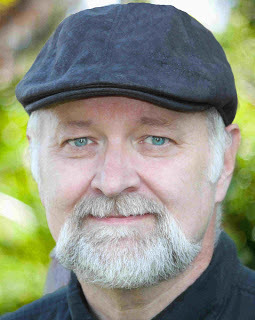
I'm honored to have David Farland with us today to give us his take on the importance of character emotions and how reactions can often surprise and enthrall readers.
David has written and edited fifty
published books and has trained
several international bestselling
authors like Brandon Sanderson in fantasy, Brandon Mull in middle-grade
fiction, and Stephenie Meyer in young adult fiction.
David also teaches workshops, is the creator of David Farland’s Daily Kick in the Pants, an email
bulletin for writers, and, well, has the most amazing eyes (seriously, take a look!) His award-winning YA Fantasy novel, Nightingale sounds incredibly fantastic. I've included the blurb below, so make sure to take a peek!
Surprising
Emotions by David Farland
When I was thirteen, I met my grandfather
for the first time, and he told me about his life in the Mafia. “I ran whorehouses and gambling joints in the
Midwest, for more than thirty years,” he said, “mainly from Detroit down into
Chicago.” It’s the kind of admission
that I would expect a person to shrink from making, rather vile and
repugnant. But you should have seen
him. His back straightened, his chin
rose, and his gaze drifted wistfully to the horizon. He was so proud to have been a mob boss.
I learned a lot about my grandfather that
day, but he spoke little, so the most important things that I learned came from
visual cues.
For writers, learning how to describe the
physical manifestations of emotions is vital.
But just as important is knowing when
to focus on showing an emotion and what emotion to focus on.
As a judge for a large writing contest, I frequently
read manuscripts where new authors spend a great deal of time giving me the physical
cues of emotions that we rather all expect.
Thus, the descriptions can feel boring and over-wrought, even if they’re
honest.
You have to decide when to focus.
You see, if your character is facing a
charging rhino, your reader will expect that he’s scared. In fact, if you depict the charge well, the
reader will actually feel some fear. His
adrenaline will surge, his heart will beat faster, his muscles will tighten, blood
will rush to his brain, his mouth will dry.
The physical manifestations won’t be as strong as when you actually live
through the incident, but the echoes will be there.
So I may not need to focus on my
protagonists emotions too much in that circumstance.
But when a character has a surprising reaction to an incident, then
it becomes imperative to document what’s happening. Surprising reactions can be one of three
kinds.
Under-reaction. Let’s go back to
our charging rhino. What if, instead of
having my character turn tail and run, as all of his companions do, he only
becomes slightly discomposed? It may be
a signal he has faced death before and knows exactly what to do, or that he’s
just the kind of person who loves to face a challenge. So as an author, I might want to spend a bit
of extra time and effort showing his reaction.
Over-reaction
can also be fun.
Let’s imagine that our character is a seasoned big-game hunter at the
turn of the twentieth century. He’s
Teddy Roosevelt, a war hero, with an elephant gun. A rhino charges. The other hunters in the party expect him to
stand boldly in the rhino’s path, take careful aim, and bring the behemoth
down. Instead, Teddy takes one look, his
eyes roll back in his head, and he faints.
That kind of over-reaction—the fluttering eyes, the stricken expression,
even his slow fall to the ground—might be worth a good page or two.
Wrong
Reactions. Let’s
face it, sometimes characters don’t react to a situation the way that we think
that they should. For example, evidence
indicates that one tribe of ancient Neanderthals both ate woolly rhinos—and worshipped
them. To kill one, the hunter had to
face it as it charged, then hurl a spear at point-blank range as he dodged
aside.
So how would such a Neanderthal react to
such a charge? Imagine that his children
are hiding in a cave. His pregnant wife is
hungry, and god has come to give himself.
An eager hunter might react to the charge with tears of joy. He might race toward his prey singing songs
of thankfulness. And once again, I want
that account to be drawn to graceful perfection.
In short, when
you’re writing character emotions, don’t report every sundry emotion—surprise
us, both with the type of emotion you’re portraying and with your
loquaciousness at portraying it!
Nightingale
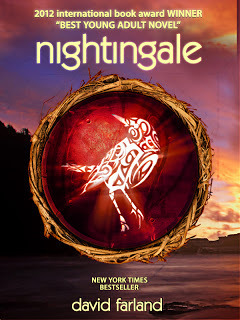
Some
people sing at night to drive back the darkness. Others sing to summon
it. . . .
Bron Jones was abandoned at birth. Thrown into foster care, he was rejected by
one family after another, until he met Olivia, a gifted and devoted high-school
teacher who recognized him for what he really was--what her people call a
"nightingale."
But Bron isn't ready to learn the truth. There are secrets that have been
hidden from mankind for hundreds of thousands of years, secrets that should
remain hidden. Some things are too dangerous to know. Bron's secret may
be the most dangerous of all.
This book has some pretty amazing reviews, and I'm adding it to my Goodreads! If you'd like to as well, you can find it HERE. A big thanks to David for hanging out with us today--I am now trying to think of ways to create a surprise reaction on my NANO novel!
David has a lot of great things going on at his website (including a boatload of writing tips!) and you can find him on both FaceBook and Twitter.
Happy writing and enjoy the weekend, everyone!

Published on October 19, 2012 03:30
October 15, 2012
YA Author Janet Gurtler: Deadlines, Sourcebooks & a GIVEAWAY
If you are like me, there's nothing better than meeting a writer you knew online in person. Okay, okay, there is something better--having lunch with them because you live in the same city, cheering as they release books into the world, and best of all, getting to call them a friend.
Enter my friend and YA author, Janet Gurtler.
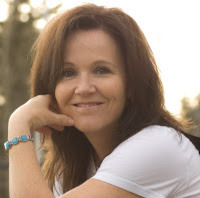
Janet is uber talented...and that isn't just the friendship talking. She's releasing her third book with Sourcebooks, and I couldn't be happier for her! Just a few days ago, I attended her launch party (way awesome) for WHO I KISSED and had to quickly snag a book before they were all gone. (Yes, her writing is that good!)
One thing I admire most about Janet is her amazing ability to focus and write. Since May 2011, she's released 3 books! I am amazed. In awe. And completely gobsmacked that she is able to accomplish so much in such a short time!
So, I asked her here to tell us a bit about what it's like. AND, I have her newest book to give away to one lucky Muser (US & Canada only). Stay tuned and read on!
DEADLINES by Janet Gurtler
The last two books I wrote were under contract before they
were finished. That is an amazing thing. To be able to write a book that you
know is going to be published. Trust me, I’ve written my fair share of books
tucked away that will never be seen by anyone. It’s tough to keep the faith and
keep writing when you’re not sure if your books are ever going to be published.
Well. I shouldn’t speak for anyone else but me. For me it was hard. So to know
what I’m working on will someday be encased under a cover and available in bookstores
is amazing. I consider myself very lucky.
Writing under contract also introduces a new concept.
Deadline. It’s kind of an ominous sounding word isn’t it? Dead plus a line. On the other hand, I remember hearing about
writers with a deadline before I was published, heck even after I was published,
and thinking it sounded delightful and delicious. Mmmm. Deadline. Trust me, it really is, but
it’s also a little intimidating. Scary. Good scary. Along with the knowledge
that people are going to read the words you’re writing is the OH MY GOD
knowledge that people are going to read the words. So they better be good. But no pressure. Right?
The other side of the deadline is the line. And the part
where you’re dead if you don’t cross it on time. At least it feels that way. I would be
absolutely devastated if I missed a deadline. And it’s funny that no matter how
much time I get, for me it always seems to come down to the last month. I don’t speak for anyone but myself. For me
it all comes down to crunch time. I kind of instinctively know where I have to
be by that month and when. And then it’s messy house, take-out for the boy,
nose buried in the laptop, busy. The
story becomes all consuming. It’s up late late at night so emerged in the story
that I sometimes blink at my son and husband and have to remind myself who they
are. And strangely, I kind of love
it. I’m not so sure if they agree.
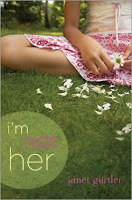 Though each publishing house is probably different with
Though each publishing house is probably different with
timelines, I think with deadlines you tend to write to a shorter timeline. I know friends who have done Write For Hire
books and their deadlines are super tight. So there’s no time to wait for your muse to
speak to you. You have a deadline, you’re expected to keep it.
I am absolutely thrilled to be publishing with Sourcebooks. After WHO I KISSED was turned in, I signed a new three-book contract. They are
definitely a publishing house that gets behind their writers. They are amazing at branding, all you have to
do is look at my covers to see what I mean.
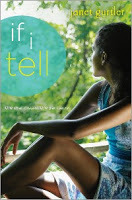
But branding also means keeping momentum going. And so does
a three book contact. This means that they want books available for certain
seasons. Publishing houses work way ahead of the current schedule. Sourcebooks had a sales meetings not too long ago, looking at their Fall 2013 line up. So, that often means tight deadlines from
contracted writers, because there’s production and editing deadlines that have
to be met on their end. An editor is
balancing and juggling a great number of books and doing a million other jobs
to get books out and marketed, and man they have to have awesome time
management skills.
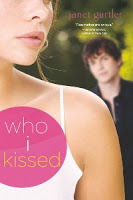
Fortunately, I can write fairly fast and deadlines don’t
destroy me. Though again, fast is relative. I have writer friends who can write
three or four novels a year. Others
write one novel in two years. So when
taking on deadlines, I guess it’s about taking on what you know you can
complete on time.
I am the type of writer who truly appreciates the revision
process. For me the hardest part of writing a book is the drafting. I have an
idea and I know where I want to go but I’m not quite sure how I’m going to get
there. Deadlines actually help with that
process because in order for your editor to let your write your book, you have
to give them a taste of it. Chapters and a synopsis.
The other thing that honestly helped with the tight deadline
on my last two books was the wonderful book available from this very blog: The
Emotion Thesaurus. (I SWEAR I did not pay her to say this, lol!) When writing the first draft I was often whipping down the
story and knew I’d need to plump it up and add texture and layers later. Mmmm.
Revisions.
I found myself writing dialogue or scenes and then marking ACTION
HERE or BEAT HERE. And later I often
consulted the thesaurus as a guide to help me to round out my scenes, to add
more SHOW and take out more TELL.
I’m starting in on Book 2 of my Contract and the deadline is
just over six months away. Between thinking, plotting, writing, and getting to
know my characters, it’ll give me enough time to be done. Can’t wait. Best get
started!!!
~ * ~ * ~
Okay, I still don't know how she does it. Perhaps she has a clone. Or seven. Yes, I am sure this must be it! Whatever she does, I hope she keeps at it, because more books means we all win!
Speaking of, want to WIN Janet's latest, WHO I KISSED? Just leave me some contact info in the comments!
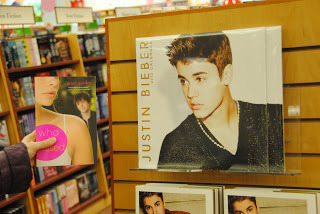
Even BEEBS is checking out WHO I KISSED!
She never thought a kiss could kill...
Samantha didn't mean to hurt anyone. She was just trying to fit in…
and she wanted to make Zee a little jealous after he completely ditched
her for a prettier girl. So she kissed Alex. And then he died--right in
her arms.
Sam is now the school pariah and a media sensation--how did she not
know Alex had a peanut allergy? Consumed with guilt, she'll have to find
a strength that goes way deeper than pulling off a fastest time in the
200-meter butterfly. Because if she can’t figure out how to forgive
herself, no one else will either.
Want to find out more about Janet's books? Check out her blog, find her on Twitter and if you like, add her books to your Goodreads!


Enter my friend and YA author, Janet Gurtler.

Janet is uber talented...and that isn't just the friendship talking. She's releasing her third book with Sourcebooks, and I couldn't be happier for her! Just a few days ago, I attended her launch party (way awesome) for WHO I KISSED and had to quickly snag a book before they were all gone. (Yes, her writing is that good!)
One thing I admire most about Janet is her amazing ability to focus and write. Since May 2011, she's released 3 books! I am amazed. In awe. And completely gobsmacked that she is able to accomplish so much in such a short time!
So, I asked her here to tell us a bit about what it's like. AND, I have her newest book to give away to one lucky Muser (US & Canada only). Stay tuned and read on!
DEADLINES by Janet Gurtler
The last two books I wrote were under contract before they
were finished. That is an amazing thing. To be able to write a book that you
know is going to be published. Trust me, I’ve written my fair share of books
tucked away that will never be seen by anyone. It’s tough to keep the faith and
keep writing when you’re not sure if your books are ever going to be published.
Well. I shouldn’t speak for anyone else but me. For me it was hard. So to know
what I’m working on will someday be encased under a cover and available in bookstores
is amazing. I consider myself very lucky.
Writing under contract also introduces a new concept.
Deadline. It’s kind of an ominous sounding word isn’t it? Dead plus a line. On the other hand, I remember hearing about
writers with a deadline before I was published, heck even after I was published,
and thinking it sounded delightful and delicious. Mmmm. Deadline. Trust me, it really is, but
it’s also a little intimidating. Scary. Good scary. Along with the knowledge
that people are going to read the words you’re writing is the OH MY GOD
knowledge that people are going to read the words. So they better be good. But no pressure. Right?
The other side of the deadline is the line. And the part
where you’re dead if you don’t cross it on time. At least it feels that way. I would be
absolutely devastated if I missed a deadline. And it’s funny that no matter how
much time I get, for me it always seems to come down to the last month. I don’t speak for anyone but myself. For me
it all comes down to crunch time. I kind of instinctively know where I have to
be by that month and when. And then it’s messy house, take-out for the boy,
nose buried in the laptop, busy. The
story becomes all consuming. It’s up late late at night so emerged in the story
that I sometimes blink at my son and husband and have to remind myself who they
are. And strangely, I kind of love
it. I’m not so sure if they agree.
 Though each publishing house is probably different with
Though each publishing house is probably different withtimelines, I think with deadlines you tend to write to a shorter timeline. I know friends who have done Write For Hire
books and their deadlines are super tight. So there’s no time to wait for your muse to
speak to you. You have a deadline, you’re expected to keep it.
I am absolutely thrilled to be publishing with Sourcebooks. After WHO I KISSED was turned in, I signed a new three-book contract. They are
definitely a publishing house that gets behind their writers. They are amazing at branding, all you have to
do is look at my covers to see what I mean.

But branding also means keeping momentum going. And so does
a three book contact. This means that they want books available for certain
seasons. Publishing houses work way ahead of the current schedule. Sourcebooks had a sales meetings not too long ago, looking at their Fall 2013 line up. So, that often means tight deadlines from
contracted writers, because there’s production and editing deadlines that have
to be met on their end. An editor is
balancing and juggling a great number of books and doing a million other jobs
to get books out and marketed, and man they have to have awesome time
management skills.

Fortunately, I can write fairly fast and deadlines don’t
destroy me. Though again, fast is relative. I have writer friends who can write
three or four novels a year. Others
write one novel in two years. So when
taking on deadlines, I guess it’s about taking on what you know you can
complete on time.
I am the type of writer who truly appreciates the revision
process. For me the hardest part of writing a book is the drafting. I have an
idea and I know where I want to go but I’m not quite sure how I’m going to get
there. Deadlines actually help with that
process because in order for your editor to let your write your book, you have
to give them a taste of it. Chapters and a synopsis.
The other thing that honestly helped with the tight deadline
on my last two books was the wonderful book available from this very blog: The
Emotion Thesaurus. (I SWEAR I did not pay her to say this, lol!) When writing the first draft I was often whipping down the
story and knew I’d need to plump it up and add texture and layers later. Mmmm.
Revisions.
I found myself writing dialogue or scenes and then marking ACTION
HERE or BEAT HERE. And later I often
consulted the thesaurus as a guide to help me to round out my scenes, to add
more SHOW and take out more TELL.
I’m starting in on Book 2 of my Contract and the deadline is
just over six months away. Between thinking, plotting, writing, and getting to
know my characters, it’ll give me enough time to be done. Can’t wait. Best get
started!!!
~ * ~ * ~
Okay, I still don't know how she does it. Perhaps she has a clone. Or seven. Yes, I am sure this must be it! Whatever she does, I hope she keeps at it, because more books means we all win!
Speaking of, want to WIN Janet's latest, WHO I KISSED? Just leave me some contact info in the comments!

Even BEEBS is checking out WHO I KISSED!
She never thought a kiss could kill...
Samantha didn't mean to hurt anyone. She was just trying to fit in…
and she wanted to make Zee a little jealous after he completely ditched
her for a prettier girl. So she kissed Alex. And then he died--right in
her arms.
Sam is now the school pariah and a media sensation--how did she not
know Alex had a peanut allergy? Consumed with guilt, she'll have to find
a strength that goes way deeper than pulling off a fastest time in the
200-meter butterfly. Because if she can’t figure out how to forgive
herself, no one else will either.
Want to find out more about Janet's books? Check out her blog, find her on Twitter and if you like, add her books to your Goodreads!

Published on October 15, 2012 21:57
October 13, 2012
Physical Attribute Entry: Feet

WANA Commons, Lynn Kelley Author
Physical description of a character can be difficult to convey—too much will slow the pace or feel 'list-like', while too little will not allow readers to form a clear mental image. If a reader cannot imagine what your character looks like, they may have trouble connecting with them on a personal level, or caring about their plight.
One way to balance the showing and telling of physical description is to showcase a few details that really help 'tell the story' about who your character is and what they've been through up to this point. Think about what makes them different and interesting. Can a unique feature, clothing choice or way they carry themselves help to hint at their personality? Also, consider how they move their body. Using movement will naturally show a character's physical characteristics, keep the pace flowing and help to convey their emotions.
FEET
Descriptors : dry, cracked, bony, stinky, flat, arched, hairy, dainty, dirty, calloused, bunioned, rough, tan, pale, long, short, knobby, ticklish, heavy, leathery , clumsy, loud, quiet
Things Feet Do (and other words/phrases to describe those actions)
Run: hurry, race, dash, dart, flee, hustle, jog, scramble, scurry, scamper
Walk: amble, meander, ramble, saunter, step, stride, hike, lumber, pace, plod, roam, shamble, shuffle, stroll, strut, toddle, tramp
Tiptoe: whisper, sneak, steal, patter, pad
Key Emotions and Related Foot Gestures:
Anger: stamp, kick, run, stomp, crush, hammer, pound, trudge
Worry: shuffle, nudge, scuff, shift, scrape, jitter, tingle, jump, fidget, pace
Sadness: drag, shamble, stumble, trip, weaken, go numb or limp
Simile and Metaphor Help :
Loud: I prayed no one would hear us as we crept down the hall, but with Gayle’s duck feet slapping the tile, it was only a matter of time.
Hairy: He had feet like a hobbit’s: brown and leathery and in need of a comb.
Clichés to Avoid : two left feet, tripping over one’s own feet, clown feet, feet like boats
HINT: When describing any part of the body, try to use cues that show the reader more than just a physical description. Make your descriptions do double duty.
Example: Dicey saw the woman the moment the woman saw her. The woman sat on the bottom of some steps facing out, over more fields (only these had crops growing in them) and the distant dull green of marsh grass. She wore a shapeless blouse over a long, shapeless skirt. Her feet were bare and caked with earthy dirt. (Homecoming, Cynthia Voigt)
BONUS TIP: The Colors, Textures and Shapes Thesaurus in our sidebar might help you find a fresh take on some of the descriptors listed above!

Published on October 13, 2012 00:30
October 11, 2012
The Path To 10K In Sales: Strategy, Luck & Mistakes
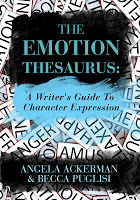
I’ll admit my mind is blown knowing there are over
10, 000 Emotion Thesaurus books out there in the world. Becca and I are
thrilled, and so appreciative to all the writers and teachers who took a chance
on it. As aspiring novelists, we know just how hard it is to write and the perseverance it takes to create a book. Providing a tool
to help other writers with emotion is nothing short of an honor (sappy, I know, but
true. Writers rule and we love you guys!)
In that same spirit of wanting to contribute, we thought it
might be beneficial to share our focus as we sent The Emotion Thesaurus into
the world. We realize this is a non-fiction book, not fiction. Novels are a harder sell--instead of dealing primarily with what a audience NEEDS like NF, it is
more about what they WANT, and personal reading tastes are unpredictable.
However, much of the strategy we used with the ET can be adapted for fiction, so
hopefully novelists will find value here regardless.
A Bit of History...
As many of you know, The Emotion Thesaurus started on the
blog as a 'set' of lists focusing on how to show a character’s feelings. Becca and I
struggled with emotion, and when we could not find a good resource to help us, we
created one. As it grew in popularity, readers asked us to turn it into an
enhanced book version.
We chose self publishing for a few reasons, the most
important being TIME. It can take years for a book to find a publisher and then
be available to purchase, and writers and teachers needed it NOW. We also
discovered someone pirating our content for profit, so waiting any longer to
create the book would be foolhardy. We launched The Emotion Thesaurus: A Writer’s Guide To Character Expression on
May 14th, 2012.
What We Had Going For
Us
PLATFORM. Becca and I have worked since 2008 to build a place
within the Writing Community, providing resources through this blog and forging
genuine relationships with our audience. Our attitude has always been to
contribute and do what we can to add value. It was our hope that our readers would be
willing to help raise awareness for The Emotion Thesaurus book.
NICHE. Our book tackled a topic that writers struggle with,
yet few resources were available to help. As writers, we knew exactly what type
of tool was needed to help with emotion and body language.
What Stood Against Us
LACK OF CREDIBILITY. Becca and I were not authors (yet), nor
accredited editors, and certainly not psychologists or experts on emotion. We had
a platform, but no ‘book world’ clout. How could we possibly compete with the
biggies in the Writing Resource field, names like Donald Maass, James Scott
Bell, James N. Frey, The Plot Whisperer, or the dozens of other incredible, best-selling
authors/experts?
SELF PUBLISHING. While the stigma is lessening, we all know bias remains. In some ways, creating a how-to writing resource and then choosing
self publishing over traditional acted as a strike against us, meaning we would
have to really prove ourselves with readers.
CONFIDENCE. This business is often a murky pool of feeling
not worthy, not good enough. Without a
book deal in place for our fiction to give us credibility or a degree/subject-specific
education to hold up, we felt naked. Putting ourselves out there and donning
the hat of authority that comes with writing any sort of how-to guide was
terrifying.
The Scale Tipper
PASSION, BELIEF & TEAMWORK. As writers, we knew people
needed this book. Heck, we needed it! We decided to create the best
brainstorming tool we could and put all our effort into making it discoverable to those who might benefit from it. Working as a team allowed
us to play off each others' strengths and aided in decision-making.
READYING FOR LAUNCH
Set up a business
Paid for a professional
edit
Hired a cover designer
Outsourced formatting to a
HTML goddess because the book is full of links and redirects
Test-marketed it with a
select group of writers & used feedback to strengthen
MISTAKE: choosing a launch date and under-estimating the
time it would take for setting up the business (two authors in different
countries is a pain), uploading, formatting challenges, fixing last minute
typos (again, our formatter Heather is worth her weight in gold!) This created lots of down-to-the-wire
stress. Test marketing the book (while super valuable) also meant enabling changes late in the game.
First Hurdle:
Launching A Book Without Feeling Like A Timeshare Salesman
For two writers who hate promoting, this was a massive
challenge. Look at me! I have a book! Buy
it! <---our personal
nightmare. We needed a way to let people know about the ET but not be
eye-bulging, book-waving maniacs about it. After many facetimes, we realized that to do this in a way that felt right,
we needed to return to our AUTHOR BRAND: writers
helping & supporting other writers.
“Random Acts of Kindness for Writers” became our secret plan: instead of making our release date about us, we would do something to celebrate & thank writers. This was risky in the sense that to do it
authentically, we had to steer attention AWAY from our book’s release. However,
we felt the reward was twofold--traffic to our site,
and it allowed us a way to pour our flag-waving passion into celebrating people
who really deserve recognition and yet rarely get it. This event aligned perfectly with our pay-it-forward beliefs, driving us to do all we could to make it a success.
For
brevity's sake, I won’t get into the nuts and bolts of how we set up
the RAOK Blitz (but if enough people wish it, I can expand on this in a future post).
Suffice to say it drew thousands of visitors and hundreds of writers participated, becoming a huge ‘feel good’ week for everyone that showcased
the generous spirits of our Writing Community. :)
Marketing Boost: Becca and I gave away a free PDF called
‘Emotion Amplifiers’ as our RAOK gift to writers.
This PDF booklet is a companion to The Emotion Thesaurus and has a similar layout. Our hope was that if a writer found it helpful, they might check the ET as well. (It’s still in our
sidebar if you want a copy and helps with describing conditions like pain, exhaustion, stress,
inebriation, etc.)
Second Hurdle:
Reviews
A self-published book that is also non-fiction? Rough. Many professional
reviewers will not take on SP books, and those that do usually only read
fiction. So, instead of seeking out review sites, we put out a call out to Bookshelf Muse readers and asked
if any of them were interested in reviewing the book. After all,
the ET is BY writers FOR writers. Who better to review it? :)
We could not accommodate all the requests that came in, so
we chose some reviewers strategically for their audience reach, and others
through a random draw.
MISTAKE: We should have arranged for reviews much
sooner. Due to not leaving ourselves enough time to get the book ready to go,
we were unable to get a decent version out to reviewers until close to launch
or after.
LUCK! Many
people, after buying and using the ET, were so happy with it they wrote reviews on
Amazon and Goodreads.
MORE LUCK! These
reviews swayed even MORE people to take a chance on the book, and they in turn
became avid word-of-mouth spreaders, telling writing friends and critique
partners all about The Emotion Thesaurus. This led to better sales, top
20 ranking in several (paid) writing categories for print & kindle, a strong Amazon Best Sellers Rank, and placement on the Top Rated, Best Selling & Most Wished For lists (writing).
Marketing Tactics -
Swag
We chose to invest in a postcard-sized bookmark that
doubles as a Revision Tool. Many
bookmarks lie forgotten in a drawer, or they end up being recycled. We wanted
ours to stay right beside the computer during revisions, so we printed a ‘Crutch
Word List’ on one side--words we commonly overuse and need to weed out. Our
hope was that by making our swag useful, writers would hang onto it!
Spreading the word about a book can be difficult, so we put
out a call (again utilizing our blog readers) and asked if people would be
willing to take our bookmarks and hand them out to critique groups, or give
them out at conferences and workshops. This allowed us to reach out beyond our
own circle and hopefully reach new readers.
MISTAKE (?) This was a bit pricey considering the
postage involved (some were sent worldwide), and took time to get addresses and
mail out. We had no way to track the effectiveness. And while I have heard from
people who said they saw them at conferences or were given one by another
writer, we are not sure if the ‘mail out’ idea brought a significant return. But, the
postcards are super handy to have at events where Becca and I are presenting,
and we can pass them out afterward to keep the ET in people’s minds. So overall, this swag was worth it!
Marketing Tactics -
Discoverability
The bulk of our marketing energy went into discoverability. Because we have such an amazingly supportive audience at The Bookshelf Muse, we chose a 'grassroots' approach rather than solicit big bloggers/sites for exposure. In our initial blog post asking for assistance from readers, we utilized a sign up form so the people who wanted to help us could, and in a manner that most appealed to them. The results of this was amazing--so many people offered to help get the word out!
One of our biggest needs was bloggers willing to host us for a visit. We were overwhelmed with gratitude to see how many people were willing to do this (have I mentioned how great you all are?) and we actually had to change how our form was worded to include offering book excerpts and reblogging previous TBM posts to accommodate the response. We ended up with over 115 hosts all told.
Attempting so many guest posts caused panic attacks, obsessive chocolate binging, feelings of inadequacy *coughs* was daunting. But Becca organized everything (SHE IS AMAZING!)
and put us on an aggressive schedule that would allow us to finish them all within
a 4 month window. We created a master list of topics, most centered directly on content that would tie into Emotion & Body Language, so that each post was
a planned, quality post. The best thank you to those who offered
to help us was to write content that would bring them strong traffic, not just
exposure for us.
GUEST POST TIP: We did our best to
thank personally every person who hosted and helped. We also shared all links on
our social networks to bring new people to their blogs. We truly appreciated their time and energy, and their
desire to see us succeed.
MISTAKE #1: biting off more than we could chew. This
was an enormous amount of guest posts (with more requests coming in as a result of this visibility) and so it meant we were both unable to
write anything but blog content for a good 4 months. We managed to get them
done and we have no regrets because of the great exposure, but it also meant
other things slipped. There were a few blogging relationships and opportunities
we were unable to stay on top of because we were so busy posting elsewhere. We
also had a tough time commenting on blogs and getting email written. With such a strict timeline to adhere to, I worried about messing up and forgetting something vital, letting a host down.
MISTAKE #2: not thinking enough about how to keep up
with our own blog AND everyone else’s. Luckily as we met new people at
different blogs, we found folks who wanted to guest post for us. We were able
to give them exposure in return and bring some good content to the blog (LUCK!) So while we made a mistake about
over committing, it worked out.
MORE LUCK! These
‘seed’ guest posts led to some writing communities and bigger organizations
contacting us. This resulted in book reviews and giveaways that were included
in newsletters and offered exposure with bigger audiences. The Discoverability Tour worked!
Marketing Tactics:
Giveaways
We utilized giveaways to generate interest in our book and
bring attention to some of the blogs we visited. We purposefully did not host
book giveaways during the month of May to encourage people to buy, not wait to
win. We had a few giveaways in June and then more in July, August and
September. Some were bigger exposure opportunities like being featured in a
banner at the Writer’s Knowledge Base and as a prize at Ink Pageant (thanks
guys--you rock!) We tried to go where our readers would be, and took advantage
of opportunities that allowed us to reach beyond the Kidlit & YA writer’s
network we know best in order to create inroads with Christian and other Adult genres who might not
know us or The Bookshelf Muse.
Marketing Tactics:
Distribution Channels
Becca and I talked about going KDP Select but neither of us
could see the benefit to doing so right out the gate. In our minds, we wanted
to ask a fair price for the books and have it available across as many channels
as possible to reach readers where they are, not where we ‘chose’ to be. We
distributed widely and included a PDF option for those who did not have ereaders
or who felt more comfortable with PDF format. For those who like numbers,
here’s the breakdown to 10,000 which we hit in September:
SW
iTunes
CS-Amazon.com
(PRINT)
B&N
Kindle (Amazon.com)
Kindle
(Amazon Euro)
Kobo
Total
May
17
10
243
62
412
25
102
871
June
13
19
503
66
905
50
89
1645
July
13
22
887
78
1334
77
76
2487
August
13
33
893
56
1297
103
60
2455
September
10
32
1036
53
1282
151
21*
47
2632
Total:
66
116
3562
315
5230
406
21
374
10090
*Prior to September, Kobo sales were bundled with
Smashwords. Once Kobo created their own distribution, we uploaded direct. Sony sales are under the Smashwords umbrella.
You will notice that Print is quite strong. We
believe this is partly because many writers like 'craft' books in paperback. We also have had feedback that some original digital buyers were so pleased with the ET, they later decided to invest in a print version, too.
Pricing: We chose
the 4.99 price point for digital, and 14.99 for print. We have not changed the
price nor offered the book for free. In the future we may change our pricing,
but for now it works well with Extended Distribution, which we sell enough
through to make it important to keep.
MISTAKE: not enabling Extended Distribution right
from the start. Originally we didn’t think it would do us much good, until we
realized without it, we could not get onto Amazon.ca. Seeing as I live in
Canada, it is important that the people I meet at events or at my workshops
have a way to get the book. Not doing this before May meant a six week lag of
fielding emails from Canadians unable to buy the book.
Marketing Tactics: Paid Advertizing
We opted to not invest in any paid advertising. I think this
was the right decision for us, but do see us choosing a few select ads in the
future.
Where We Got Extra
Lucky
Winning Top 20 Best Blogs For Writers with Write To Done a few months before The Emotion
Thesaurus released. This raised our profile significantly, and at a
critical time.
Once sales started climbing,
Amazon would send out mailers to people who purchased writing related
books, and sometimes The Emotion Thesaurus was listed as a ‘Those that
purchased X might also like’ pick.
A price war between B
& N and Amazon. For the last week of September, the two duked it out,
lowering the book’s price daily until the discount put it under 10 bucks.
Average sales nearly doubled for print (although sales dipped that week
for Kindle).
A Few Extraneous
Mistakes
Not soliciting endorsements. We didn’t do this in advance of
publishing the ET because we were worried about being turned down, worried
about getting the cold shoulder because we were newcomers and new authors.
Now more than ever we are seeing an acceptance of SP, and of Traditional
authors making the leap. Endorsements probably would have helped us
greatly and so moving forward we’ll be seeking them out.
Not believing in ourselves enough at the start. I think we
wasted a lot of energy on doubt because we hadn’t published before (except
in magazines) and we were afraid that while we felt The Emotion Thesaurus
added value, others would not. The response to The Emotion Thesaurus has
been nothing short of phenomenal and knowing that Illinois State
University is using it in their Creative Writing curriculum makes us
incredibly proud. A self published book going to University...who would have thought?
Thoughts to Leave You
With
Looking back, I believe we did two things right that led to everything
else:
First, we created
a book that readers are very happy with, and it fulfills a need in a way that
they are excited to share it with people they know. (We are so, so, SO grateful to
this word-of-mouth. Thank you all for doing this!)
Second, we live
our brand: writers who help and support
other writers. This is who we are! We love writers and have forged genuine
relationships with our readers. When we needed help to spread the word, people
responded, and more than that, became our advocates. There are not enough thank
yous in the world for me to say what this means to us.
If I can encourage writers
planning to publish to do one thing beyond the above, it’s to be authentic in
whatever you do. When you build your platform, start in advance and think
very hard about what your brand will be. Be yourself, be likable, do what feels
right and resonates with who you are. Understand your audience, their likes and
dislikes, and search them out. Use keywords to find blogs, forum discussions
and hashtags that will help you discover people who might be interested in a book like yours. Interact, be genuine and think about how you can add
value, not how you can market to them. Focus on giving, not getting. Trust that
the rest will come. :)
Do you have any questions about what we did or why? Becca and I are happy to answer if we are able. And again, the biggest, squishiest, bacon-filled thank you for all your support of us and the ET. Your word-of-mouth has allowed writers and teachers everywhere to discover this book!

Published on October 11, 2012 03:00
Writers Helping Writers
A place for writers to find support, helpful articles on writing craft, and an array of unique (and free!) writing tools you can't find elsewhere. We are known far and wide for our "Descriptive Thesau
A place for writers to find support, helpful articles on writing craft, and an array of unique (and free!) writing tools you can't find elsewhere. We are known far and wide for our "Descriptive Thesaurus Collections" which help authors create vivid imagery and sensory detail for their Settings, Characters (physical descriptions, emotions, skills & talents, etc.), Symbolism, Weather, and a whole bunch more. Stop in and say hello! :) http://writershelpingwriters.net/
...more
- Angela Ackerman's profile
- 1023 followers



